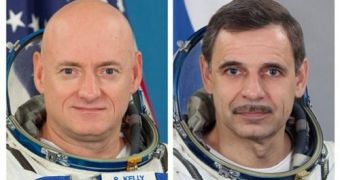NASA and the Russian Federal Space Agency Roscosmos selected two veterans – Scott Kelly and Mikhail Kornienko – for a one-year mission on the International Space Station.
The mission will be launched in spring 2015 with the astronauts' return to Earth planned for spring 2016, Space reports.
The expedition is intended to provide scientific information on the human body's abilities to bear long-lasting space trips, valuable for eventual expeditions around the solar system.
The two astronauts will travel aboard a Russian Soyuz spaceship, launching from the Baikonur Cosmodrome in Kazahstan, according to NASA.
“Selection of the candidate for the one year mission was thorough and difficult due to the number of suitable candidates from the Cosmonaut corps,” Roscosmos leader Vladimir Popovkin declared.
“We have chosen the most responsible, skilled and enthusiastic crew members to expand space exploration, and we have full confidence in them.”
Kelly, a former U. S. Navy captain from West Orange, has a spaceflight experience of over 180 days, and Kornienko, a retired paratrooper officer, has a record of 176 days spent in space.
Kelly and Kornienko are not at their first collaboration. They have previously worked together in the station's mission Expedition 23/24.
In early 2013, the two astronauts will begin a training program in the US, Russia and certain associate countries.
“Congratulations to Scott and Mikhail on their selection for this important mission,” said William Gerstenmaier, associate administrator for NASA's Human Exploration and Operations in Washington.
“Their skills and previous experience aboard the space station align with the mission's requirements.”
The mission's leaders are fairly optimistic regarding the expedition's results.
“ The one-year increment will expand the bounds of how we live and work in space and will increase our knowledge regarding the effects of microgravity on humans as we prepare for future missions beyond low-Earth orbit,” William Gerstenmaier declared.

 14 DAY TRIAL //
14 DAY TRIAL //